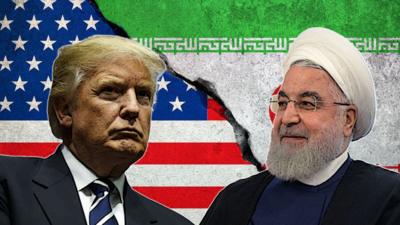Despite mounting tensions with Iran, no U.S. draft will occur
February 4, 2020
After the assassination of Iranian general Qasem Soleimani on Jan. 3 by a US-authorized missile strike, World War III memes started to trend all across social media. In response to Soleimani’s death, Iran launched missiles at U.S. military bas- es in Iraq on Jan. 7. As tensions between the U.S. and Iran increased, young people began to wonder if they were about to be drafted into the military. According to Senior Marine Instructor Captain Gary Baxter, the reinstatement of the draft would require massive action by the government.
“In order for conscription [the draft] to be re- instated, it would require both houses of Congress and the President,” Baxter said. “There would just have to be a tremendous amount of political and national will for something like that to happen, and there’s just not.”
After Soleimani’s assassination, people flooded the Selective Service System’s website, causing it to crash due to the panic. The Selective Service requires men ages 18-25 to register. Refusing to sign up can bring a hefty fine of up to $250,000 and ineligibility for federal student aid for college. However, Baxter points out that sign- ing up for the Selective Service doesn’t mean that men will be drafted.
“There shouldn’t be any confusion between registering for the Selective Service and the draft,” Baxter said. “The purpose of the Selective Service is an accounting of the individuals in our country, the fighting age males, and knowing how many there are. That’s what it’s about. Selective Service and the draft are completely different.”
In response to the fear over the draft, the Selective Service tweeted out a message saying that it was conducting “business as usual” and that “there is no military draft.” History teacher Daniel Parrish believes that social media is responsible for exaggerating the situation.
“I know why people are concerned right now,” Parrish said. “This whole thing blew up on social media, and that’s really where I think people’s consternation about the possibility of join- ing Selective Service again came from. But there has been no indication by the federal government that [the draft] is going to occur.”
The draft was abolished in 1973, during the Vietnam War. Since then, the military has been entirely volunteer-based. Parrish believes that the odds of a draft in the future are extremely low.
“If you look back through the history of war, most wars are fought with boots on the ground. For a good chunk of history, wars are: if we have more people than you, we have an advantage. And so, there was a need for a draft,” Parrish said. “Today, there’s a couple reasons why that’s no longer the case. Number one: we have a standing army right now of about 12 million soldiers. The second reason why the draft is not, or probably not, going to be needed in the future is because wars are fought differently now. We have smart weapons, we have technology, we have the ability to use drones against an enemy. It just lends itself to not needing a big standing army.”
Every military draft in the past has been met with opposition by the public. According to Parrish, a polarizing event like a draft in today’s divided political environment could lead to wide- spread dissent.
“I do believe that in our current climate, that if the draft is brought back, you would see some protests in that,” Parrish said. “If we look back historically speaking, there have always been protests against drafts.”
Even though there is not going to be a draft any time soon, Parrish urges students to be aware of current events.
“Have an understanding of what’s going on in the world. Not just in the U.S. or with our interests around the world, read what’s going on in other countries,” Parrish said. “I don’t think we’re in a situation here where we’re getting close to a World War III or anything of that magnitude, but I think that there’s no doubt that the killing of Soleimani heightened tensions in the region. It’s certainly going to have a ripple effect. Keep up with current events because you never know when the next tiny event is going to set off larger ramifications around the world.”




